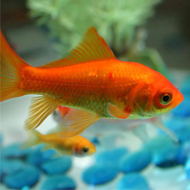
Reports of drinkers downing shots containing live fish
Criminal prosecutions may be brought by the RSPCA after its received reports of people eating live fish as part of an online drinking craze.
The RSPCA says it has already received at least 14 calls about fish being eaten alive as part of the Neknominating drinking game currently taking place on social media websites.
It said people were filming themselves quickly drinking large amounts of alcohol and then nominating a friend to do the same. The challenges also involve carrying out extreme feats on camera – and that in turn has led to reports of videos of people drinking shots of alcohol with a fish inside.
RSPCA wildlife scientist Nicola White said: “We are extremely concerned about this shocking new trend. We have had quite a few similar cases reported to us in a very short space of time – but this could be just the tip of the iceberg as there’s probably many more we have not been told about.
“Eating a live animal and posting of a film of it on the internet is not some light-hearted joke – it is unacceptable. It sends out a clear message that animal cruelty is ok as long as it is in the guise of entertainment.
“We urge people not to take part in this horrible craze and to report to us anyone who is taking part.”
Since the weekend there had been at least 14 calls to the RSPCA about ‘Neknominating’ footage involving swallowing live fish.
An RSPCA spokeswoman said: "Eating live fish is an offence under the Animal Welfare Act, and the RSPCA are investigating several of the cases which have been referred to us. Because of this we are unable to go into detail of individual cases until more is known."
Images by www.clubantietam.com and Ben Webb



 The RCVS has announced a new version of its 1CPD mobile app, with enhanced features for veterinary surgeons and veterinary nurses to record their continuing professional development.
The RCVS has announced a new version of its 1CPD mobile app, with enhanced features for veterinary surgeons and veterinary nurses to record their continuing professional development.